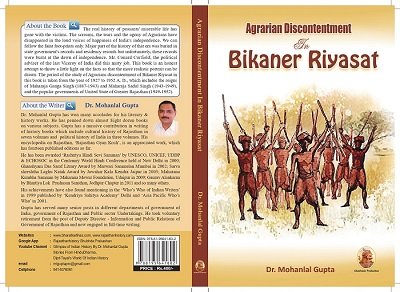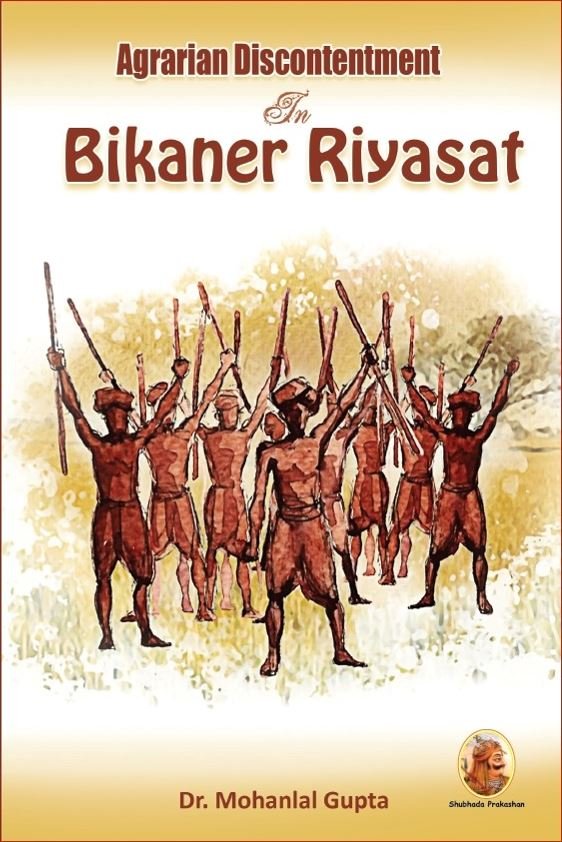This book is a real documentation of Agrarian Discontentment In Bikaner Riyasat.
Centuries will come and go but the history of erstwhile princely states of India will remain interesting. In Mughal era and British era, some princely states of Rajputana gained fame for their gallant history. The princely state of Bikaner or Bikaner Riyasat was also one of them.
Though Bikaner Riyasat was the sixth largest State amongst all the Indian States and the second largest in Rajputana, but it was almost a desert area. It was having no irrigation facility, no modernized techniques of agriculture and almost no industrialization before Ganga Singh’s reign.
The development of agriculture has been continued on the traditional lines. The source of production was land with the same implements and the same set of simple people. The whole region consisted of a large number of villages surrounded by fields for cultivation, pastures for grazing and forests for fuels. Even then the people were happy under traditional rule of Rathors.
There was a deep rooted confidence and faith between ruling class and the masses till 18th century but in 1818 A.D., Bikaner Maharaja entered into a treaty with East India Company which was known as the treaty of Subsidiary Alliance.
After this treaty, British took a huge amount of cash from the state every year and state officials started to collect this money from their subject, mostly from peasants. After 1858, British crown started to strengthen the Jagirdari and Zamindari systems in native principalities to sustain its rule in princely India.
The Jagirdar being supreme in internal matters in his Jagir, enjoyed exclusive executive, administrative and police powers and appointed officials to look after the day to day administration of the Jagir.
The Jagirdar or Thakur of a big Jagir was the prototype of the ruler in his own Jagir and enjoyed a semi-independent status. When Britishers opted the policy of protection of Jagirdars, the Jagirdars became Britishers’ closest friends and trustworthy servants of them.
They started to ignore the dignity of native ruler and native ruler could do nothing against them. It happened many times in Bikaner Riyasat also. Maharaja Ganga Singh tried to take action against such disobedient Thakurs like Bheru Singh but was completely helpless. These events generated the anarchy in Jagirs.
There were many more reasons of lawlessness in Jagir areas. As the ruler of state lost control over Jagirdars, the Jagirdars increased the lag-bags (taxes and levies) and begar (unpaid labour) to such an extent that the lives of peasants became extremely difficult. The peasants suffered from high rents, illegal levies, arbitrary evictions and unpaid labour in Zamindari areas.
The Government levied heavy land revenue. All expenses incurred, from birth to death, by a member of the Jagirdar’s family were borne by the tenants. The Jagirdars claimed that taking lag-bags and begar from the public was their birth-right.
When the people are unduly suppressed, there comes a time when they stand up and revolt even at the risk of their lives. This is exactly what had happened in erstwhile princely state of Bikaner as well as in many other states of Rajputana.
Now the deep rooted trust and faith between ruling class and the masses began to breach. Atrocities done by Jagirdars developed discontentment in Agrarian society and the Peasents stood-up to fight for their own demands. The Agrarian agitations in the period between 1858 and 1914 tended to remain localised, disjointed and confined to particular grievances, contrary to the movements after 1914.
A flood of Agrarian agitations could be seen all over India between 1920 and 1940. Unfortunately, no native ruler could handle this situation and the discontentment in native states continued till the end of the existence of these states.
The period of the study of socio-economic condition of Agrarians of Bikaner Riyasat in this book is taken from the year of 1927 to 1952 A. D., which includes the reigns of Maharaja Ganga Singh (1887-1943) and Maharaja Sadul Singh (1943-1949), and the popular governments of United State of Greater Rajasthan (1949-1952).
The study is based mainly on the Archival Records available in the Rajasthan State Archives, Bikaner and National Archives of India, New Delhi. In this context the old files of prominent newspapers, both in English and Hindi, Rajputana Gazetteers, proceedings of Rajasthan History Congress etc. have also been consulted.
The history of the political movements in the states could be written through the records of Praja mandal and Praja Parishads, proceedings of Chamber of princes, white papers issued by the government and the news papers of that period but the real history of peasants’ miserable life has gone with the victims. This history was not recorded anywhere.
The screams, the tears and the agony of Agrarians have disappeared in the loud voices of happiness of India’s independence. We can follow the faint foot-prints only. Major part of the history of that era was buried in state government’s records and residency records but unfortunately, these records were burnt at the dawn of independence.
Conard Corfield, the political adviser of the last Viceroy of India did this nasty job. He ordered the princely state’s employees and residency officials to burn the files and papers regarding the atrocities of rulers, Jagirdars, Thakurs and the members of royal families. It is said that 4 tones of records were burnt.
Conard Corfield could burn the evidence of truth but not the essence of truth. Truth is like the sun. One can shut it out for a time, but it will not go away.
Much has been written about the Prajamandal movements of Bikaner Riyasat but less on socio-economic condition of Agrarians and Agrarian agitations of this large and prominent state of British era. This book is an honest attempt to throw a little light on the facts so that the more realistic portrait can be drawn.
My aim is just to throw a little light on the huge truth. It may be bitter in taste but it will always remain fresh. There is a popular saying- ‘Stop hanging out with people that tell you what you want to hear.’ Hang out with people who tell you the truth.
I understand that this book is not the last truth of this subject, it is just a beginning. As soon as the bags of princely state’s records are opened in the archives, the truth will reveal itself with its full glory.
– Dr. Mohanlal Gupta





